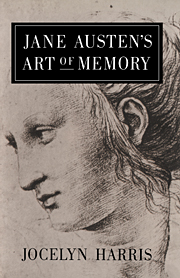Book contents
- Frontmatter
- Contents
- Preface
- 1 Northanger Abbey
- 2 The return to Richardson
- 3 Sense and Sensibility
- 4 Pride and Prejudice
- 5 Mansfield Park
- 6 Emma
- 7 Persuasion
- Conclusion: ‘Nothing can come of nothing’
- Appendix 1 The History of Sir Charles Grandison
- Appendix 2 Sir Charles Grandison in the juvenilia
- Notes
- Bibliography
- Index
Conclusion: ‘Nothing can come of nothing’
Published online by Cambridge University Press: 18 August 2009
- Frontmatter
- Contents
- Preface
- 1 Northanger Abbey
- 2 The return to Richardson
- 3 Sense and Sensibility
- 4 Pride and Prejudice
- 5 Mansfield Park
- 6 Emma
- 7 Persuasion
- Conclusion: ‘Nothing can come of nothing’
- Appendix 1 The History of Sir Charles Grandison
- Appendix 2 Sir Charles Grandison in the juvenilia
- Notes
- Bibliography
- Index
Summary
To look through the spectacles of books reveals Jane Austen's mind. Locke in Northanger Abbey, Richardson and Milton in Sense and Sensibility, Pride and Prejudice, and Mansfield Park, Shakespeare in Emma, and the whole range of English literature from Chaucer to Coleridge in Persuasion, were to Jane Austen as the classical authors to Fielding, a rich common where every person with a tenement in Parnassus has the right to fatten his muse (Tom Jones, XII. 1). Member as well as inaugurator of the great tradition of English literature, as F. R. Leavis saw, she steps outside fiction to fill that tradition in.
Jane Austen's relationship to her predecessors is always changing. Sometimes she bounces off them as if unable to resist rewriting or commenting upon them; sometimes the relationship looks much more open and free. Locke, Shakespeare, and Chaucer are more generally invigorating in Northanger Abbey, Emma, and Persuasion than Richardson and Milton in the first three published books. As in Dryden's idea of imitation, Jane Austen the translator now ‘assumes the liberty not only to vary from the words and sence, but to forsake them both as [s]he sees occasion: and taking only some general hints from the Original, to run division on the ground-work, as [s]he pleases’ [Poems, I.182). Nor does she any longer pause to criticise or rewrite authors so obviously companionable to her. Emma and Persuasion do not continually check themselves as if they lived part of their lives in other books.
- Type
- Chapter
- Information
- Jane Austen's Art of Memory , pp. 213 - 221Publisher: Cambridge University PressPrint publication year: 1989

